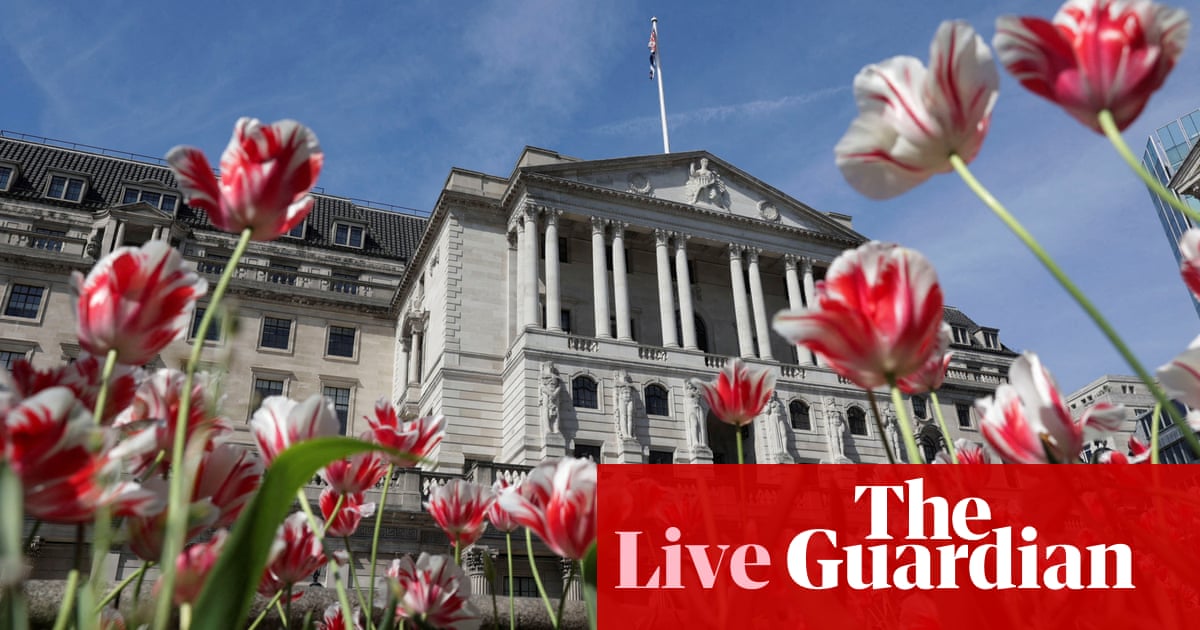Introduction: Bank of England sets interest rates at noon
Good morning, and welcome to our rolling coverage of business, the financial markets, and the world economy.
Britain’s central bank could inch closer to its first cut in interest rates since the start of the pandemic today.
The Bank of England is widely expected to leave interest rates on hold at its latest monetary policy committee (MPC) meeting. But the MPC may also give hints about how soon it will start to lower rates from their current 16-year high of 5.25%.
As inflation dropped to 3.2% in March, nearer the Bank’s 2% target, policymakers can have some hope that price pressures are easing; headline inflation is expected to soon fall below 2%.
But wage growth – last clocked at 6% year-on-year – appears to be too high for the Bank’s comfort.
The BoE will release its latest economic forecasts at noon, alongside the interest rate decision, followed by a press conference 30 minutes later.
This morning, the money markets suggest there’s just a 5% chance of an interest rate cut today, with a 95% likelihood that the MPC leaves rates on hold.
But today’s decision may not be unanimous. At the last meeting, in March, the MPC voted by a majority of 8–1 to maintain Bank Rate at 5.25%; could a second dove join policymaker Swati Dhingra and vote for a cut?
Bank of England Meeting
9 May, ThursdayRates are expected to remain at 5.25%, with a previous 8-1 vote to keep rates unchanged, amid differing opinions and a focus on new inflation projections and their impact.
— Vantage (@vantagemkts) May 6, 2024
Karen Ward, chief market strategist for EMEA at J.P. Morgan Asset Management, argues that the Bank should look through short-term dip in inflation and not cut rates today.
Ward explains:
“With real wages returning to positive growth, the economy appears to be gaining momentum. That means the current dip in inflation we’re seeing is likely temporary, with a possible resurgence on the cards for the second half of the year.
“By late summer, the Bank of England may have more evidence of easing underlying pressures. However, for now, I think it should communicate that its target is medium-term and, just as it looked through 10% headline inflation, it should also look through a short-term dip in inflation.”
Looking further ahead, the money markets currently expect the Bank’s first cut to come by August, with a second likely in November or December.
But some City economists believe the Bank could cut rates as soon as June.
Kathleen Brooks, research director at XTB, says:
The market is expecting the first rate cut from the BOE between June and August. If the BOE does intend to cut rates next month, then we would expect to get a clear indication from the Bank on Thursday that this could happen.
Conversely, if the Bank pours cold water on a June rate cut, the market could be disappointed, sterling may rally, and UK Gilt yields could rise, Brooks adds.
The agenda
-
11am BST: Ireland’s inflation data for April
-
Noon BST: Bank of England interest rate decision
-
12.30pm BST: Bank of England press conference
-
1.30pm BST: US weekly jobless claims
-
5.15pm BST: Virtual Q&A with Bank of England chief economist Huw Pill
Key events
Five reasons the Bank of England may cut rates today
Katharine Neiss, chief European economist at PGIM Fixed Income, argues that it is “not beyond the realm of possibilities” that the Bank could cut interest rates today.
Neiss gives five reasons why this week’s meeting is “likely more finely balanced” than the market expect”:
-
First, the Monetary Policy Committee (MPC) does not mind surprising markets. We saw this back in November 2021, when the market was expecting the Bank to hike when ultimately it chose to keep rates unchanged. It subsequently raised rates at its December meeting. The point is, the Bank doesn’t feel the need to precision-steer markets to the timing of rate changes.
-
Second, the BoE was raising rates much earlier than either the Federal Reserve or European Central Bank in the latest hiking cycle. That means that, other things equal, they can cut earlier too.
-
Third, some of the last interest rate rises put through by the Bank were on the back of the mini-budget fallout in the autumn of 2022. Now that some distance has been put between that episode and today, those insurance hikes could be taken out while still keeping rates in restrictive territory.
-
Fourth, inflation in April could well be at or just below the Bank’s 2% inflation target due to strong energy-related base effects. It could look odd for the Bank to remain on hold against a backdrop of inflation back at target, and risks the MPC being tagged as too late on the way down as well as on the way up.
-
Finally, May is a forecast month. Though MPC members, including the Governor, have been at pains to stress that ‘all meetings are live’, a forecast publication month does allow more space for the Bank to communicate its views and outlook. Market rates are now expected to be high for longer on the back of a resilient US economy, putting inflation and activity lower over the MPC’s forecast horizon and offering yet another signal that cuts are on their way.
Surveyors: high mortgage rates are deterring house buyers

Hilary Osborne
The number of homes for sale in the UK rose in April, but recent rises in mortgage rates started to deter would-be buyers, according to the latest report from surveyors.
The Royal Institution of Chartered Surveyors (Rics) said more of its agents had reported a rise in new instructions by sellers than at any point since September 2020, when the post-Covid bounce was still in effect.
It said this boost in listings suggested people were feeling more comfortable about entering the market.
However, at the same time, recent increases in mortgage rates have slowed buyer demand.
Although the start of the year saw a flurry of mortgage rate cuts, costs have been edging up in recent weeks.
Rightmove’s latest weekly snapshot of the mortgage market showed that the average interest rate on a five-year fixed-rate mortgage had gone above 5% for the first time since January, and that, at 5.02%, the cost was higher than the 4.56% recorded a year ago.
Two-year fixed rates are also typically more expensive than in May 2023, with the average up from 4.84% to 5.41% this week.
Simon Rubinsohn, chief economist at Rics, said:
“Feedback to the latest Rics survey demonstrates the sensitivity of the sales market to interest rates at the present time, given the continuing challenge around affordability.
“A modest back up in mortgage pricing has contributed to the flatlining in the buyer enquiries metric over the past month, as well as the slightly more cautious signals around near-term expectations.”
The BoE is also under some political pressure to start cutting interest rates soon, as falling borrowing costs would help Rishi Sunak argue that the economic picture was brightening.
Back in March, Sir Geoffrey Clifton-Brown, a senior Conservative MP, said the Bank should move to cut rates to boost economic growth.
As my colleague Phillip Inman wrote last weekend:
In an election year, the government might feel more of a sense of urgency about a reduction. After the historic swing against the Conservatives in the Blackpool South byelection and the loss of many council seats, a return to some kind of normal economic progress is considered by many ministers to be their best hope in the battle with Labour.
With inflation forecast to fall below the 2% target as early as next month, pressure on the Bank to cut rates, and by more than once this year, is likely to intensify as Tory frustration grows.
The independent Bank will be more focused, however, on the dismay among businesses and mortgage-payers needing to refinance their loans. If consumer and business confidence, which has improved in recent months, goes into reverse, the economy will suffer and dramatic cuts in interest rates will be needed to spur a revival.
How Bank policymakers are split over when to cut rates
The Bank’s policymakers do appear split on when to cut rates, judging by their recent comments.
Last month, deputy governor Dave Ramsden declared that he has become “more confident” that domestic inflation pressures are receding. Ramsden argued that UK inflation could hold around the Bank of England’s 2% target for the next three years, rather than rising at the end of this year as the Bank had expected.
Governor Andrew Bailey predicted “quite a strong drop” in the next inflation reading.
But other policymakers have sounded more cautious.
Huw Pill, chief economist, argued in April that “the time for cutting bank rate remains some way off.”
And external policymaker Megan Greene has said that the UK wage growth and services inflation “just aren’t consistent” with keeping inflation sustainably at the 2% target.
Introduction: Bank of England sets interest rates at noon
Good morning, and welcome to our rolling coverage of business, the financial markets, and the world economy.
Britain’s central bank could inch closer to its first cut in interest rates since the start of the pandemic today.
The Bank of England is widely expected to leave interest rates on hold at its latest monetary policy committee (MPC) meeting. But the MPC may also give hints about how soon it will start to lower rates from their current 16-year high of 5.25%.
As inflation dropped to 3.2% in March, nearer the Bank’s 2% target, policymakers can have some hope that price pressures are easing; headline inflation is expected to soon fall below 2%.
But wage growth – last clocked at 6% year-on-year – appears to be too high for the Bank’s comfort.
The BoE will release its latest economic forecasts at noon, alongside the interest rate decision, followed by a press conference 30 minutes later.
This morning, the money markets suggest there’s just a 5% chance of an interest rate cut today, with a 95% likelihood that the MPC leaves rates on hold.
But today’s decision may not be unanimous. At the last meeting, in March, the MPC voted by a majority of 8–1 to maintain Bank Rate at 5.25%; could a second dove join policymaker Swati Dhingra and vote for a cut?
Bank of England Meeting
9 May, ThursdayRates are expected to remain at 5.25%, with a previous 8-1 vote to keep rates unchanged, amid differing opinions and a focus on new inflation projections and their impact.
— Vantage (@vantagemkts) May 6, 2024
Karen Ward, chief market strategist for EMEA at J.P. Morgan Asset Management, argues that the Bank should look through short-term dip in inflation and not cut rates today.
Ward explains:
“With real wages returning to positive growth, the economy appears to be gaining momentum. That means the current dip in inflation we’re seeing is likely temporary, with a possible resurgence on the cards for the second half of the year.
“By late summer, the Bank of England may have more evidence of easing underlying pressures. However, for now, I think it should communicate that its target is medium-term and, just as it looked through 10% headline inflation, it should also look through a short-term dip in inflation.”
Looking further ahead, the money markets currently expect the Bank’s first cut to come by August, with a second likely in November or December.
But some City economists believe the Bank could cut rates as soon as June.
Kathleen Brooks, research director at XTB, says:
The market is expecting the first rate cut from the BOE between June and August. If the BOE does intend to cut rates next month, then we would expect to get a clear indication from the Bank on Thursday that this could happen.
Conversely, if the Bank pours cold water on a June rate cut, the market could be disappointed, sterling may rally, and UK Gilt yields could rise, Brooks adds.
The agenda
-
11am BST: Ireland’s inflation data for April
-
Noon BST: Bank of England interest rate decision
-
12.30pm BST: Bank of England press conference
-
1.30pm BST: US weekly jobless claims
-
5.15pm BST: Virtual Q&A with Bank of England chief economist Huw Pill







